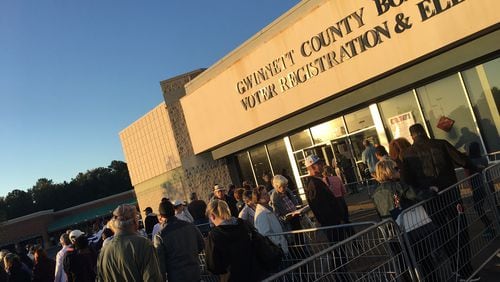Latino advocacy groups are not yet satisfied with the efforts of Gwinnett County and its cities to comply with a new federal mandate to provide Spanish-language voting materials and assistance.
Local officials, meanwhile, say they’ve made “enormous strides.”
The Georgia Association of Latino Elected Officials and LatinoJustice sent a letter this week to Gwinnett County's elections director and legal team, expressing concern that the government wasn't doing enough to provide "clear, complete and accurate" voting materials in Spanish. Last December, the U.S. Census Bureau gave Gwinnett County for the first time a designation that requires communities to provide bilingual "ballot access" if more than 5 percent of voting-age residents are of a single language minority and have difficulty speaking English.
Gwinnett, the only county in Georgia to receive the designation, is home to about 171,000 Latinos. Under the designation, ballot access includes offering everything from online election information to voter registration forms in the mandated language.
Gwinnett does not have a countywide election scheduled next month, but many of its municipalities do. The Census Bureau designation covers those jurisdictions too, and the county is charged, at least to some degree, with helping them comply.
In the letter they sent Wednesday, GALEO and LatinoJustice conceded that “municipalities within Gwinnett County are working together to translate materials in a standardized fashion” and that Gwinnett is “in the process of developing a bilingual registration form.”
But the groups took issue with the “outdated federal Spanish language voter registration forms and assistance guides” they said Gwinnett and its cities are using in the meantime. Their letter also claims that the cities of Auburn, Braselton, Duluth, Berkeley Lake, Snellville and Sugar Hill are using translations on their websites that are “not fully accurate nor complete.”
The groups asked to arrange a meeting with county officials.
Citing pending litigation between the county and GALEO (which involves separate voting rights claims unrelated to ballots), Gwinnett spokesman Joe Sorenson declined to comment on a possible meeting with the group. He did say, however, that the county had made "enormous strides toward full compliance" and continues to "work diligently to complete the task."
“We will have timely completed everything required of the county in advance of the city elections,” Sorenson wrote in an email, “and will have very little left to do beyond that to reach full compliance.”
Only three cities specifically called out by GALEO and LatinoJustice regarding translations – Braselton, Duluth and Sugar Hill – have municipal elections scheduled for November.
Stephen Pereira is the city attorney for Duluth, and his law firm also represents Sugar Hill and two other Gwinnett cities.
Pereira said the cities represented by his firm believe that are already in compliance but were willing to meet with the advocacy groups.
“We want to hear them out,” Pereira said. “… We look at this as a potential to continue to keep doing a good job.”
MYAJC.COM: REAL JOURNALISM. REAL LOCAL IMPACT.
The AJC's Tyler Estep keeps you updated on the latest happenings in Gwinnett County government and politics. You'll find more on myAJC.com, including these stories:
Never miss a minute of what's happening in Gwinnett politics. Subscribe to myAJC.com.
In other Gwinnett news:
About the Author








